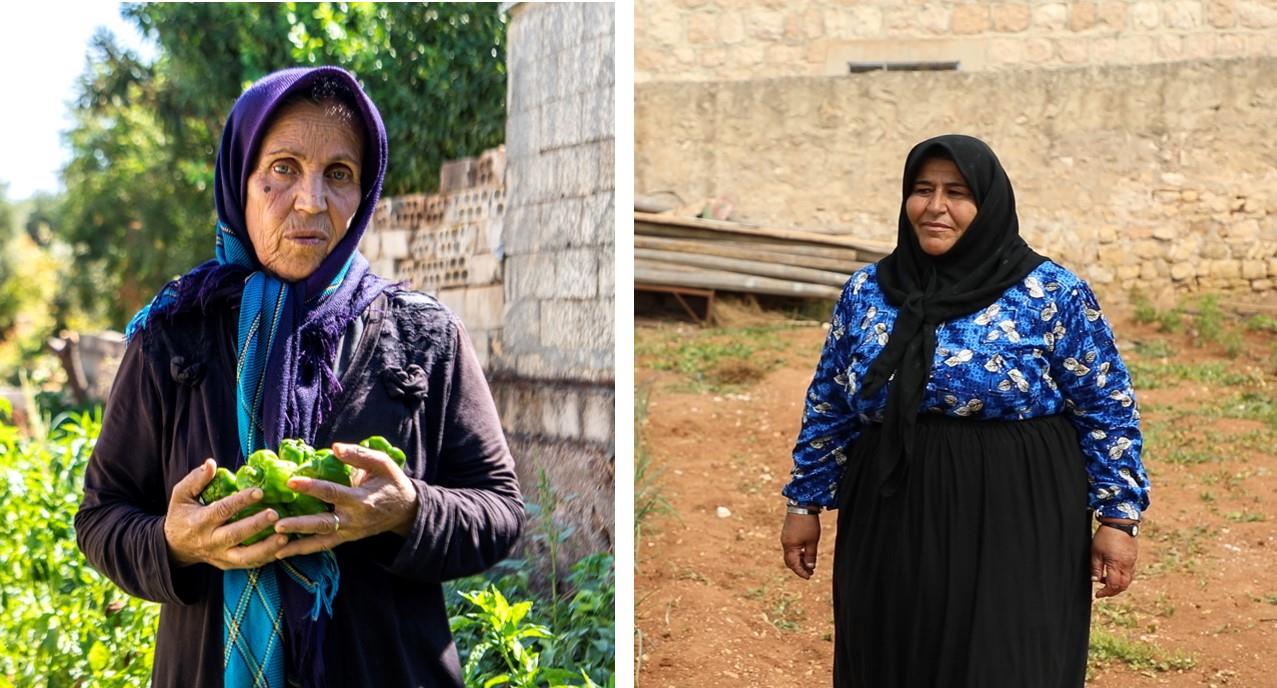FAO family farming interventions changing lives of vulnerable families in Syria

Fatima (left) and Hend (right), two Syrian family farmers.
Ten years of crisis and COVID-19 pandemic have affected the farmers’ priorities in the Syrian Arab Republic, where they seek opportunities to produce food for their own consumption, and then find ways to promote their products in the surrounding markets. However; even cultivating their small lands was challenging for them, the prices of agriculture inputs increase month after month as FAO estimates more than 81 percent increase on inputs prices between Jan to October 2020.
Fatima Hasan, and her family are among the hundreds of thousands who were driven from their home in search of safety and means of survival. Just 123 km away in Hama Governorate, Hend Salem, a women headed household, also faced much the same conditions. These vulnerable farming families have gone through tough times, facing an extremely challenging living situation, with lack of access to basic services and difficulty in securing sufficient living requirements. This problem has prevented thousands of farmers from being able to sustain their livelihoods or to carry out their usual agricultural activities.
Just like in many parts of the world, in Syria, women are traditionally responsible for vegetable production and caring for the nutritional situation of their family. However, the 10-year-long crisis in Syria has affected much of the country’s population, particularly women by placing additional responsibilities as many have turned into the head of their household.
As part of the programme to enhance the livelihood opportunities of smallholders and improve their food security situation, FAO Syria has been assisting 700 producers in the country to improve the quality and quantity of their vegetable production through nurseries that utilize low tunnels to produce seedlings, which will ultimately be transplanted in fields.
The project began in March 2020, which coincided with the spread of COVID-19, adding complications to distributing materials and carrying out trainings. Nonetheless, FAO has continued to assist vulnerable farmers by building low tunnels and planting seedlings.
Fatima, who overpassed the challenges and became a self-sufficient producer, tells her story by stating:
“The crisis has forced us to flee seeking a safe place, my children were much younger and my husband passed away back then,’’ says Fatima.
“I had a fully equipped greenhouse, but everything has been stolen when we returned home. I work hard so that my children can grow up without feeling that their father is missing,” says Fatima, taking the double role is no easy task, but nothing can stop her fierce determination.
After she received FAO’s support, Fatima was able to produce tomatoes, cucumber, eggplant, okra and other vegetable varieties using the low tunnel. “The quantity produced is enough to meet the family’s food consumption, while the surplus gets sold to the neighbors,” she stated.
On the other hand, Hend Salem have been through similar challenges too. “My life changed like other people, we all realize this, we cannot move freely anymore and our living expenses has increased,”.
With the support of FAO Hend succeeded to produce her own seedlings, yet she taught seven of her neighbors’ seedling production techniques that she gained throughout the project.
“During previous years, we used to plant randomly and the crops frequently failed to grow, but now we plant based on efficient agricultural practices”. She continues, “In return, I taught these practices to my neighbors that enables us to generate an income and meet our family’s food demands” she described.
FAO is supporting the most vulnerable rural families to enhance their livelihoods and food security; with lifesaving programmes to make people self-sufficient and productive, ensuring food access and availability for everyone is key to contribute in achieving Zero Hunger (SDG 2) in the country.
